Reiki healing techniques offer significant benefits for managing chronic illnesses, including pain relief and reduced anxiety. Patients often report enhanced emotional well-being and improved sleep quality after sessions. Research supports Reiki’s ability to lower stress hormones and promote relaxation, aiding overall health. Individual experiences vary, with some achieving profound relief and others noticing subtle improvements.

How do Reiki healing techniques work for chronic illness management?
Reiki healing techniques promote relaxation and balance, aiding chronic illness management. Practitioners channel energy to enhance the body’s natural healing processes, which can alleviate symptoms and improve overall well-being. Many patients report reduced pain, anxiety, and fatigue after sessions. Research indicates that Reiki may lower stress hormones and boost immune function, supporting recovery. Individual experiences vary, with some finding profound relief while others may notice subtle changes. This holistic approach emphasizes the mind-body connection, fostering a sense of empowerment and control over health.
What are the foundational principles of Reiki healing?
Reiki healing is based on principles such as universal energy, intention, and balance. These foundational concepts guide practitioners in channeling energy to promote healing. Reiki emphasizes the interconnectedness of body, mind, and spirit, fostering relaxation and emotional well-being. As a result, many patients report reduced stress and improved quality of life when integrating Reiki into chronic illness management.
Which techniques are commonly used in Reiki sessions?
Reiki sessions commonly use techniques such as hand placements, distant healing, and guided visualization. These methods aim to channel energy, promoting relaxation and healing in patients with chronic illnesses. Hand placements involve the practitioner lightly touching or hovering over the patient’s body to facilitate energy flow. Distant healing allows practitioners to send healing energy to patients remotely, enhancing accessibility. Guided visualization employs mental imagery to help patients focus on healing, providing an empowering experience. Each technique contributes uniquely to the overall effectiveness of Reiki in managing chronic conditions.
How is Reiki different from other holistic therapies?
Reiki differs from other holistic therapies by focusing on energy healing through gentle touch or distance healing. Unlike therapies such as acupuncture or massage, which manipulate the body physically, Reiki aims to balance the body’s energy to promote healing. Patient experiences often highlight a deep sense of relaxation and emotional release, which can enhance chronic illness management. Studies indicate that Reiki can reduce pain and improve overall well-being, making it a unique complement to traditional medical treatments.
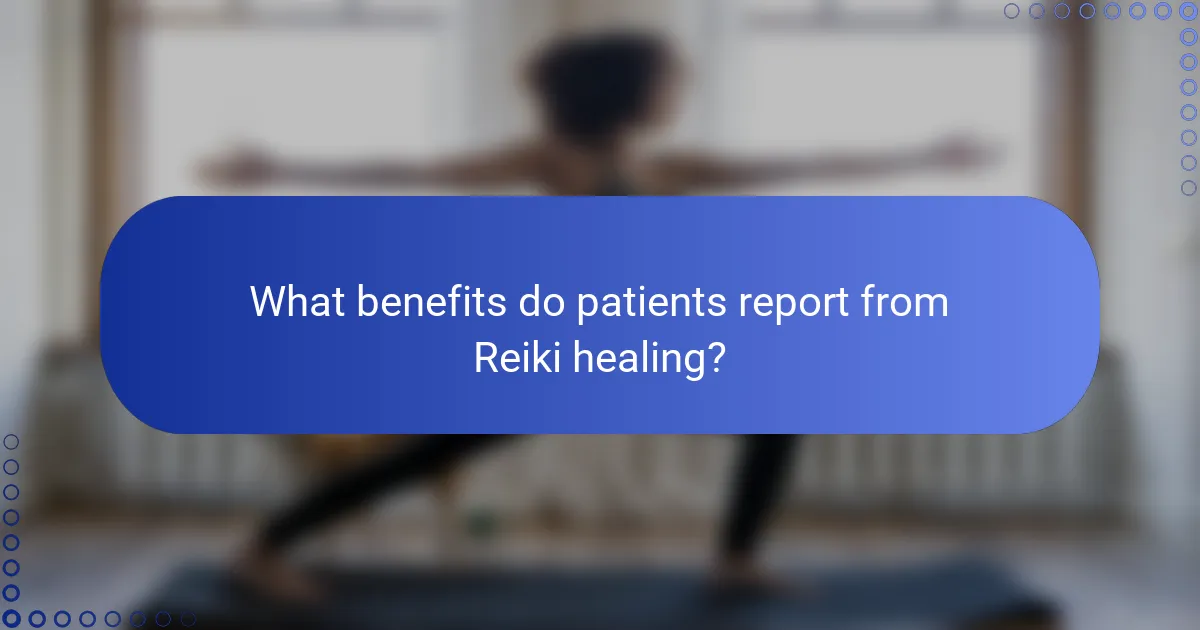
What benefits do patients report from Reiki healing?
Patients report various benefits from Reiki healing, particularly in managing chronic illnesses. Commonly cited advantages include reduced pain, decreased anxiety, improved sleep quality, and enhanced emotional well-being. Many patients experience a sense of relaxation and inner peace during and after sessions. Additionally, some individuals note an increased sense of connection to their bodies, which can aid in overall healing. Reiki may also support traditional medical treatments by promoting a positive mental state, thus contributing to better health outcomes.
How does Reiki contribute to pain relief?
Reiki contributes to pain relief by promoting relaxation and reducing stress. This holistic approach helps patients manage chronic pain by enhancing their overall well-being. Studies indicate that Reiki can lower pain levels, improve sleep quality, and increase emotional balance. Patient experiences often highlight reduced discomfort and a greater sense of control over their health.
What emotional benefits are associated with Reiki therapy?
Reiki therapy offers significant emotional benefits, including stress reduction, enhanced relaxation, and improved mood. Patients often report feelings of peace and emotional clarity. This therapy can help alleviate anxiety and promote a sense of well-being, making it beneficial for chronic illness management. As a result, individuals experience a greater emotional balance and resilience.
How does Reiki support mental well-being in chronic illness?
Reiki supports mental well-being in chronic illness by promoting relaxation and reducing stress. Patients often report improved emotional balance and a greater sense of control over their symptoms. This holistic approach can complement traditional treatments, enhancing overall quality of life. Studies indicate that Reiki can decrease anxiety levels and improve mood, providing a sense of peace during challenging times.
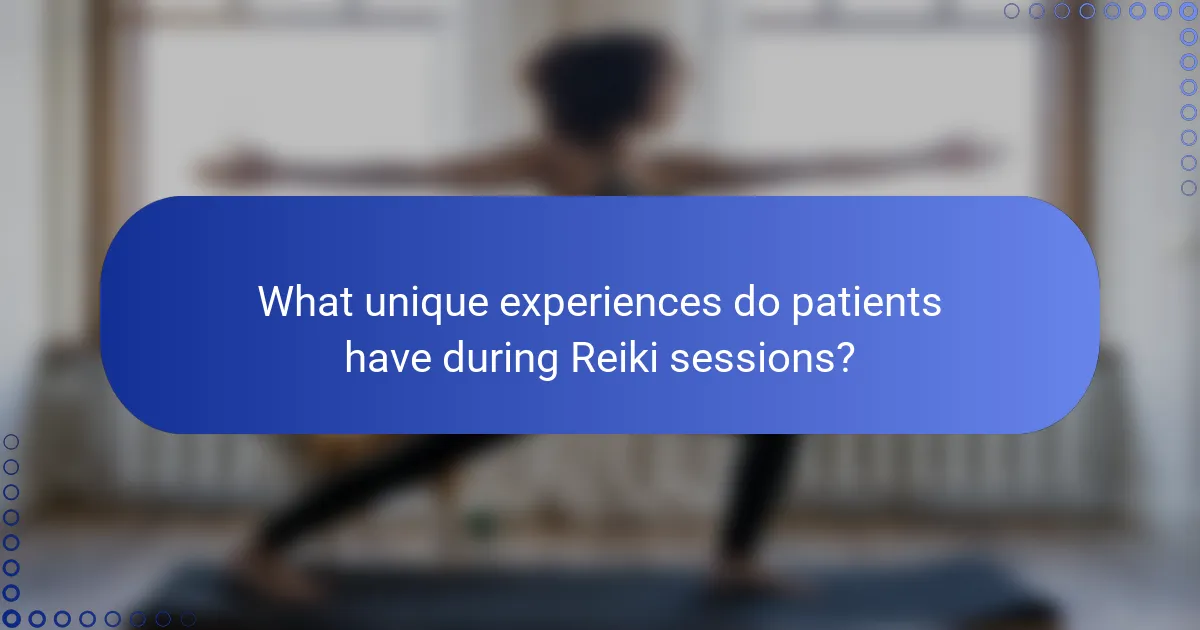
What unique experiences do patients have during Reiki sessions?
Patients experience deep relaxation, emotional release, and heightened awareness during Reiki sessions. These sessions often lead to reduced pain and stress levels, enhancing overall well-being. Unique experiences may include sensations of warmth or tingling, which indicate energy flow. Many patients report a sense of peace and clarity post-session, contributing to effective chronic illness management.
How do individual perceptions of Reiki vary among patients?
Individual perceptions of Reiki vary significantly among patients, influenced by personal beliefs and experiences. Some patients report profound emotional relief and physical benefits, citing reduced pain and improved well-being. Others may feel skeptical, viewing Reiki as unproven or ineffective. Factors such as prior exposure to alternative therapies and cultural background can shape these perceptions. Additionally, the practitioner’s skill and the treatment environment play crucial roles in shaping patient experiences. Overall, Reiki’s subjective nature leads to a diverse range of patient responses and outcomes.
What common sensations do patients report during treatment?
Patients commonly report sensations of relaxation, warmth, and tingling during Reiki treatment. These experiences often vary based on individual sensitivity and the specific areas being treated. Many patients also describe a sense of emotional release, which can contribute to overall well-being. Some report feeling a deep state of peace, enhancing their ability to manage chronic illness symptoms effectively.
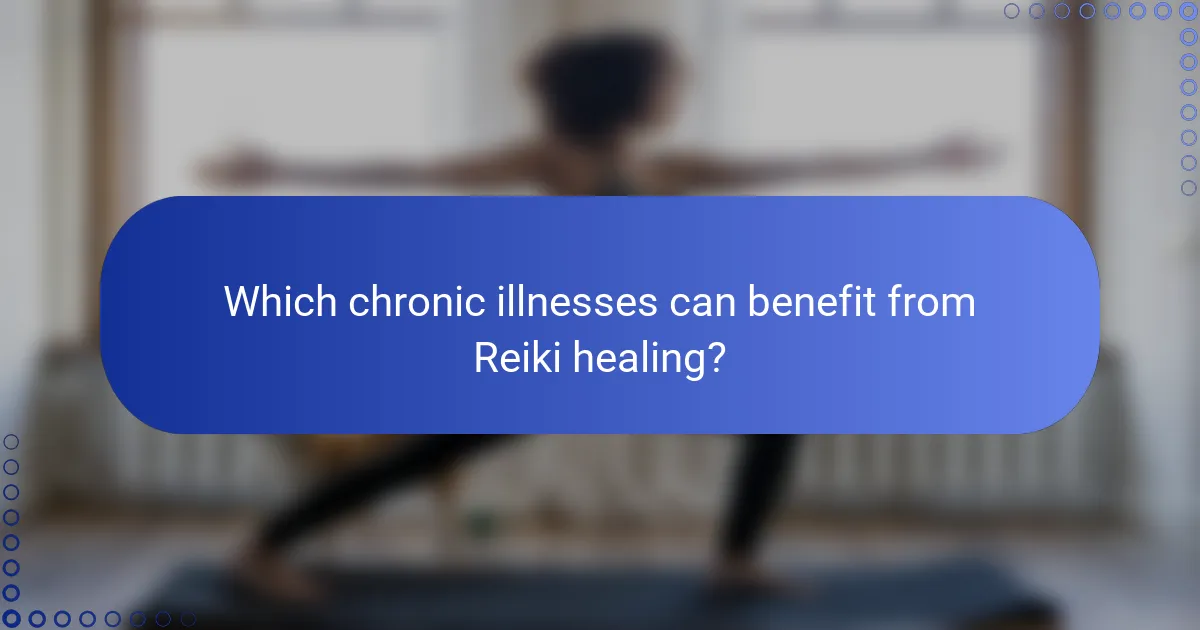
Which chronic illnesses can benefit from Reiki healing?
Reiki healing can benefit various chronic illnesses, including pain management, anxiety, and fatigue. Patients with conditions such as fibromyalgia, arthritis, and cancer often report reduced symptoms and improved well-being. Research indicates that Reiki may enhance relaxation and emotional balance, contributing to overall health. Additionally, some studies suggest it can complement traditional treatments, potentially leading to a more holistic approach to chronic illness management.
How does Reiki aid in the management of autoimmune diseases?
Reiki aids in the management of autoimmune diseases by promoting relaxation, reducing stress, and enhancing overall well-being. Patients often report decreased pain and improved energy levels. Research indicates that Reiki may help modulate the immune response, providing a supportive environment for healing. Additionally, patient experiences highlight the calming effects of Reiki, which can lead to better coping mechanisms for chronic illness. This holistic approach complements conventional treatments, emphasizing the importance of mental and emotional health in managing autoimmune conditions.
What role does Reiki play in cancer care and recovery?
Reiki plays a supportive role in cancer care by promoting relaxation and enhancing well-being. Patients often report reduced anxiety, improved mood, and better pain management through Reiki sessions. Research indicates that Reiki may improve quality of life for individuals undergoing cancer treatment, facilitating emotional and physical healing. This holistic approach complements traditional therapies, addressing both mental and emotional aspects of chronic illness management.
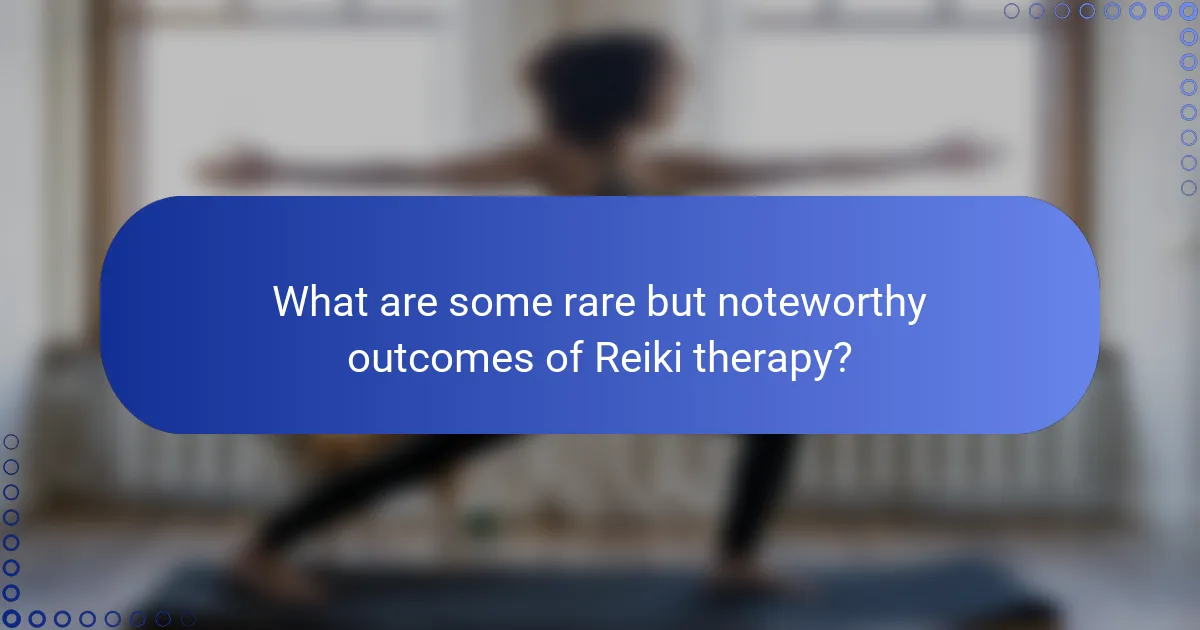
What are some rare but noteworthy outcomes of Reiki therapy?
Reiki therapy can lead to rare but notable outcomes, such as spontaneous remission of chronic illnesses, enhanced emotional clarity, and profound spiritual awakenings. Some patients report unexpected improvements in relationships and heightened intuitive abilities. These unique experiences highlight Reiki’s potential beyond conventional healing methods. Additionally, rare cases of complete pain relief and increased energy levels have been documented, showcasing the therapy’s varied impact on individuals.
How can Reiki influence the healing process in unexpected ways?
Reiki can influence the healing process by promoting relaxation, reducing stress, and enhancing emotional well-being. Patients often report unexpected benefits, such as improved sleep quality and increased energy levels. These effects can lead to a more positive mindset, which may facilitate physical healing. Additionally, Reiki may help patients manage chronic illness symptoms by fostering a sense of control and empowerment.
What unique patient stories highlight the transformative power of Reiki?
Unique patient stories illustrate how Reiki healing techniques have transformed lives by alleviating chronic pain and enhancing emotional well-being. One patient reported a significant reduction in anxiety and improved sleep after regular Reiki sessions. Another individual with fibromyalgia experienced decreased pain levels and increased energy, allowing for a more active lifestyle. These experiences highlight Reiki’s potential benefits in chronic illness management, showcasing its ability to foster healing and resilience.
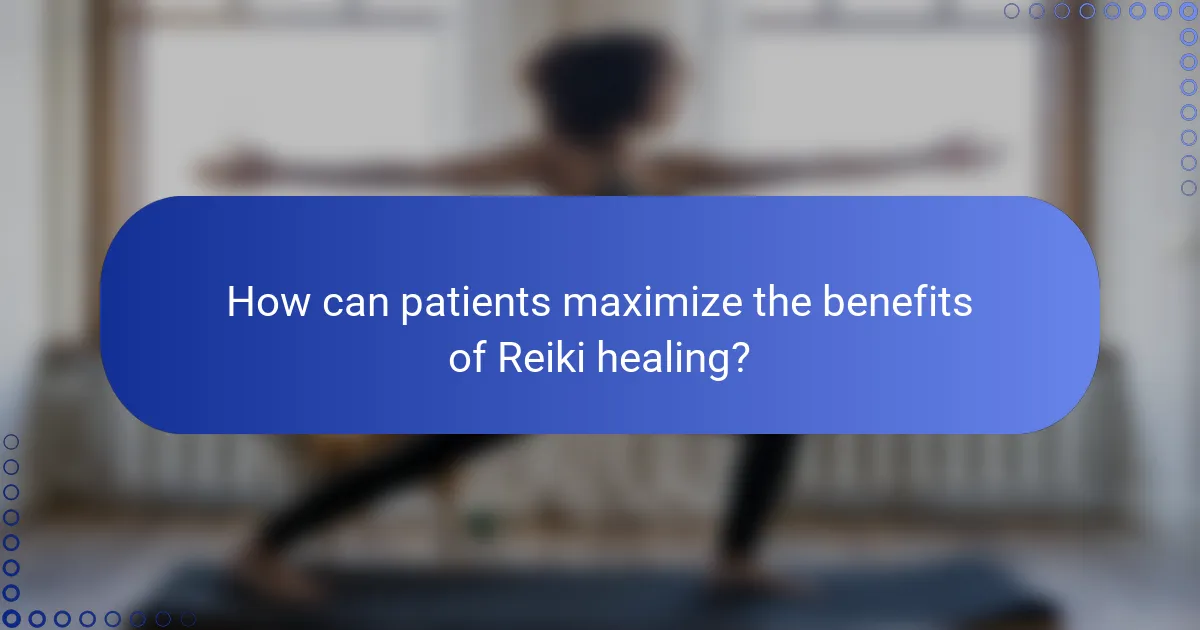
How can patients maximize the benefits of Reiki healing?
Patients can maximize the benefits of Reiki healing by actively participating in their sessions and maintaining a positive mindset. Engaging in regular Reiki sessions enhances emotional balance and physical relaxation, which are crucial for chronic illness management. Setting clear intentions before each session can guide the healing process, allowing patients to focus on specific areas of concern. Additionally, incorporating mindfulness practices, such as meditation or deep breathing, can complement Reiki and deepen the healing experience. Consistency in practice is vital; patients who commit to a regular schedule often report more significant improvements in their overall well-being.
What practices can enhance the effectiveness of Reiki sessions?
To enhance the effectiveness of Reiki sessions, practitioners should focus on creating a calming environment, setting clear intentions, and maintaining open communication with patients.
A tranquil setting promotes relaxation, allowing energy flow during sessions. Practitioners should also establish specific goals for each session, aligning their energy with the patient’s needs. Open communication fosters trust, enabling patients to express their feelings and experiences, which can guide the session’s focus.
Incorporating mindfulness techniques can further enhance the experience, helping both practitioner and patient stay present. Regular feedback from patients can also help tailor sessions to maximize benefits, particularly for chronic illness management.
Which common mistakes should patients avoid when seeking Reiki therapy?
Patients should avoid several common mistakes when seeking Reiki therapy. First, not researching the practitioner can lead to unsatisfactory experiences. Second, having unrealistic expectations about immediate results may hinder the healing process. Third, neglecting to communicate openly about health issues can prevent effective treatment. Fourth, underestimating the importance of a supportive environment can affect the overall experience. Lastly, skipping follow-up sessions may limit the benefits of Reiki for chronic illness management.